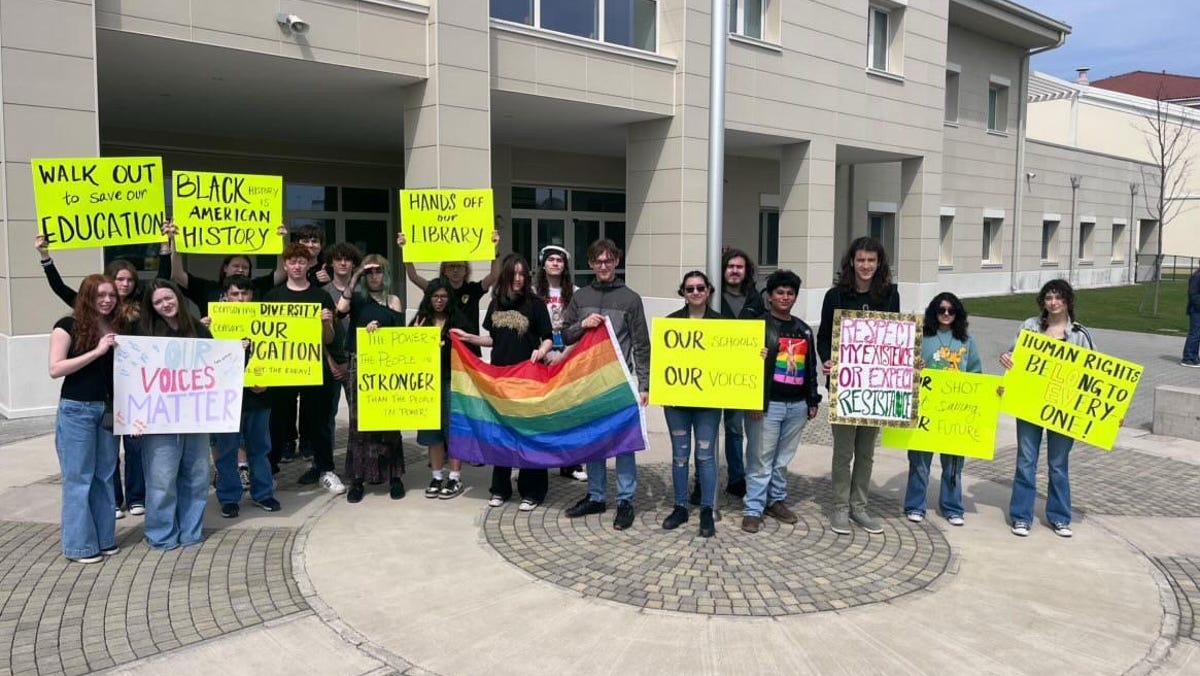Pentagon removes holocaust pages to comply with Trump’s DEI ban
The Defense Department has removed or plans to delete thousands of websites to comply with President Trump’s order eliminating diversity, equity and inclusion (DEI) initiatives. The deleted content includes pages on the Holocaust and 9/11.
unbranded – Newsworthy
Hundreds of students walked out of military schools around the globe last month, objecting to jarring campus changes since President Donald Trump took office.
The next month’s protest, on April 10, was expected to draw 1,000 from schools in Spain, Italy, Germany, England, South Korea and Japan.
Then the Defense Department stepped in. School administrators threatened to punish students who protested. Amid fear and frustration, students said, far fewer braved the walkouts.
“Kids are very outraged,” said Keira, an 18-year-old senior who leads the LGBTQ+ pride club at her school on a military base in Germany. She is among several students who asked to go by their first names to prevent retaliation against their parents.
American students in 11 countries in 10 time zones are reacting to the sudden shifts in their curriculum and campus life since Defense Secretary Pete Hegseth imposed policies that pulled books from shelves, barred courses and defunded student clubs.
Will Griffin, a spokesperson for the Defense Department Educational Activity, said the policy had not changed.
He said that “student-led walkouts in the past have concluded without serious incidents” but “the cumulative disruption” had a negative impact on classroom instruction and took resources needed to keep students safe, he said.
A threat to families
Some of the April 10 demonstrations went forward with lower-than-expected turnout. Others were canceled after parents received a letter from the Defense Department’s school system outlining its plans to punish students with unexcused absences if they missed class. Students also faced verbal threats that they would face detention or be prohibited from sports teams if they participated.
One such letter to parents at Humphreys High School in South Korea on April 8 warned that students who missed class to protest would be “subject to the progression of disciplinary measures” if they joined the rally.
Students at multiple schools told USA TODAY they were verbally threatened with automatic detention if they participated – but never in writing.
In the end, Humphreys students decided to hold the walkout during lunch to avoid discipline, according to one student who asked to remain anonymous for fear of retaliation. Around 60 students participated – fewer than at the March protest, they said.
Students said the threats were a departure from how administrators responded during the March demonstrations. Last time, they said, they were allowed a time slot to demonstrate and worked with their teachers and principals to ensure the walkouts were safe and orderly.
“They’ve started to view these (demonstrations) as against the rules,” said Elliot Field, a sophomore at Kadena High School in Japan.
Student protesters face punishments
Field, who is 15 and plays in her school band, participated in the April protest. But she was nervous about disciplinary consequences.
“I’d like to say that I’m very brave, and I’m willing to sacrifice whatever,” she said. “But yeah, I am (afraid). I really don’t like getting in trouble.”
Payton, a sophomore who helped plan the April walkout at Lakenheath High School in England, said the vice principal told him that after 20 minutes, the protest would no longer be considered peaceful. Students had planned to walk out for longer but capped their demonstration at 20 minutes to avoid punishment, he said.
Griffin, the spokesperson for the U.S. military schools, denied any such restriction on the timing of protests.
Students at multiple schools told USA TODAY that administrators said walking out would automatically disqualify athletes from future games or travel.
‘Things are just disappearing’
For Field, in Okinawa, the changes in programming since the Trump administration directives mean she can no longer participate in activities she loves.
“I was supposed to do a demonstration about Filipino martial arts to fight my sister,” said Field. “It’s just not happening anymore.”
“Things are just disappearing,” she said.
Payton, a sophomore in England, said some topics have disappeared from his school’s curriculum since the change, including lessons on the civil rights movement in his AP U.S. History class. Some advanced placement courses have been axed from next year’s course offerings, including AP Psychology and AP African American Studies.
“This is part of our history. This is part of our nation. We should be able to learn these things if we want to,” he said.
Griffin declined to comment about AP African American history. He said the U.S. military schools would continue to work with the College Board about offering AP Psychology next year.
Keira, the pride club president in Germany, said teachers are now barred from showing their support for students like her. Club posters with messages like “kindness for everyone” have been taken down, she said.
“They’ve really taken away a lot of spaces” for students to feel safe, she said. “It feels like everyone’s turned on you.”
